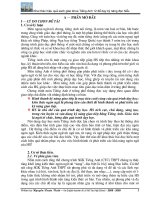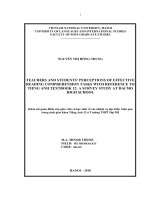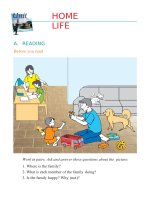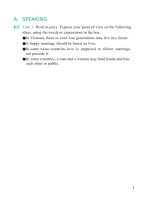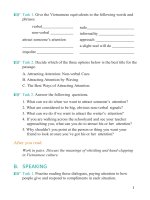Sách giáo khoa tiếng anh 12 phần 10
Bạn đang xem bản rút gọn của tài liệu. Xem và tải ngay bản đầy đủ của tài liệu tại đây (624.3 KB, 9 trang )
A. WRITING
THE SAHARA DESERT
Study the information in the table below and write a composition
about the Sahara Desert.
General information
Location
− largest desert in the world
− in northern Africa
− extends from the Atlantic Ocean eastward past
the Red Sea to Iraq
− lies largely in Morocco, Algeria, Tunisia, Libya,
Egypt, Mauritania, Mali, Niger and Sudan
Area
− total area: more than 9,065,000 sq km
− 1,610 km wide and about 5,150 km long from east
to west
Natural
features
Trees and
animals
− arid land, dry climate (moisture is almost totally
absent), very hot in summer and very cold in winter
− few oases exist
− sandy land and large dunes of sand
− tableland with an average elevation from 400
to 500 m
− few forms of animal and vegetable life
− main trees: cactus, the date palm, and a form of
acacia
− main animals: gazelle, antelope, fox, jackal, camel
B. LANGUAGE FOCUS
Pronunciation
●
● Pronunciation:
Full and contracted forms of auxiliaries
● Grammar: So, but, however and therefore
Read the following phrases. Pay attention to how the full and
contracted forms of the auxiliaries are pronounced.
Full forms
Contracted forms
Full forms
I am
you are
he is
she is
it is
we are
they are
I’m
you’re
he’s
she’s
it’s
we’re
they’re
I shall/will
you will
he will
she will
it will
we shall/will
they will
Contracted forms
I’ll
you’ll
he’ll
she’ll
it’ll
we’ll
they’ll
Practise reading these sentences.
I think I’ll buy a motorbike.
You’ll notice that there’s a girl coming.
It’ll be much better if you could do it.
We’ll have to talk to her.
She’s feeling much better now.
They’re students.
He’ll be 17 next month.
●
Grammar
Exercise 1. Add so or but and a comma where appropriate.
Examples:
It began to rain, so I opened my umbrella.
It began to rain, but he didn’t open his umbrella.
1. I didn’t have an umbrella
2. I didn’t have an umbrella
I was wearing a raincoat.
I got wet.
I didn’t get wet because
3. The water was cold
I didn’t go swimming.
4. The water was cold
I went swimming anyway.
5. Luan’s directions to his house weren’t clear
got lost.
6. The directions weren’t clear
anyway.
Binh
Binh found Luan’s house
7. Her friend lied to her
she still likes and trusts him.
8. Her friend lied to her
she doesn’t trust him anymore.
Exercise 2. Underline the correct alternative in the following
sentences.
1. Dan didn’t study for the exam, however/but Lan did.
2. You could fly via Vienna; but/however it isn’t the only way.
3. They have lived next door to us for years, yet/however we hardly
ever see them.
4. My friend and I were tired, so/however we went home early.
5. We had wanted to stay until the end of the game, but/however it got
too late for us.
6. I understand your point of view. However/Although I don’t agree
with it.
7. The normal pulse for an adult is between 60 and 80 beats per
minute, so/but/however excitement will make a pulse much faster.
8. The food didn’t look appetizing, but/however many people started
eating.
Exercise 3. Add so, therefore or however where appropriate.
Example: It began to get dark, so I turned on the light.
I think, therefore I am.
1. He worked hard,
he could earn much money.
2. The shrimp was only 2 dollars a kilo this week,
three kilos.
3. He’s been studying really hard,
exams.
4. She is still not good at Maths.
student in her class.
I bought
he can pass the
she cannot be the best
5. OK, you can take Chemistry as your major.
you
should remember that it is not easy to learn Chemistry.
6. The boy has chosen to do an MBA programme in
Australia.
I think you should let him go.
7. It was already 6 p.m.,
we closed the office and
went home.
8. Advertisers often say that their products are the best.
the real quality is not as good as it is advertised.
Unit
10
ENDANGERED SPECIES
A. READING
Before you read
Work in pairs. Look at the pictures and answer the questions.
1. Which of the animals and insects below can be found in Vietnam?
a) tortoise
2. Which of them is/are in danger of becoming extinct?
b) rhinoceros
c) monkey
f) frog
d) elephant
e) leopard
g) mosquito
h) parrot
While you read
Read the text then do the tasks that follow.
Endangered species are plant and animal species which are in danger
of extinction. Over 8,300 plant species and 7,200 animal species
around the globe are threatened with extinction, and many thousands
more become extinct each year before biologists can identify them.
The primary causes of species extinction are habitat destruction,
commercial exploitation and pollution. The drainage of wetlands,
cutting of forests, urbanization and road and dam construction have
destroyed or seriously damaged natural habitats. Since the 1600s,
worldwide commercial exploitation of animals for food and other
products has seriously reduced the number of rare species. Toxic
chemicals in the air and land, contaminated water and increased water
temperatures have also driven many species to the verge of extinction.
Plant and animal extinction leads to a loss of biodiversity.
Maintaining biodiversity is important for us in many ways. For
example, humans depend on species diversity to have food, clean air
and water, and fertile soil for agriculture. In addition, we benefit
greatly from the many medicines and other products that biodiversity
provides.
Different conservation efforts have been made in order to save
endangered species. The Red List − a global list of endangered and
vulnerable animal species − has been introduced to raise people's
awareness of conservation needs. Governments have enacted laws to
protect wildlife from commercial trade and overhunting. A number of
wildlife habitat reserves have been established so that a wide range of
endangered species can have a chance to survive and develop.
Task 1. The nouns in column A all appear in the passage. Match each
of them with a suitable definition in column B.
A
B
1. extinction
a. the existence of a large number of different
kinds of animals and plants which make a
balanced environment
2. habitat
b. the act of preventing something from being
lost, wasted, damaged or destroyed
3. biodiversity
c. a situation in which a plant, an animal, a way
of life, etc. stops existing
4. conservation
d. the natural environment in which a plant or
animal lives
Task 2. Choose A, B, C or D to complete the following sentences
about the reading passage.
1. The number of species around the globe threatened with extinction is
over
.
A. 7,200
B. 8,300
C. 1,600
D. 15,000
2. Which of the following is NOT mentioned as a primary cause of
species extinction?
A. pollution
B. natural selection
C. habitat destruction
D. overexploitation
3. The Red List is a special book that provides names of
animals.
A. vulnerable and endangered
B. hunted
C. endangered
D. extinct
4. The development of wildlife habitat reserves helps
.
A. save a large number of endangered species
B. make a list of endangered species
C. enact laws to protect wildlife
D. develop commercial trade and overhunting
5. The best title for the passage is
.
A. Endangered Species and Conservation Measures
B. Endangered Species and their Benefits
C. The Global Extinction Crisis
D. Endangered Species Extinction: Causes and Conservation Measures
Task 3. Find evidence in the passage to support these statements.
1. Pollution is one of the main causes of species extinction.
2. Species diversity has provided humans with so many essential
things.
3. There are a number of ways to help save endangered species.
After you read
Work in pairs. Summarise the reading passage by writing ONE
sentence for each paragraph.
B. SPEAKING
Task 1. Work in pairs. Ask and answer the following questions.
1. What do you call GÊu Tróc, Tª Gi¸c, Hæ, Voi in English?
2. In which sort of habitats can you find each of these animals?
3. Which of these animals can be kept as a pet or used for food or
medicine?
4. Which of them is/are endangered?
Task 2. Work in pairs. Look at the information about the giant panda, tiger,
rhino and elephant, which are endangered animals. Ask and answer questions
about them.
Example:
A: Where do giant pandas live?
B: In bamboo forests in the mountains in central and western China. A: What is
the population of pandas in the world?
B: Only about 600.
Task 3. Work in groups. Take turns to give an oral report on the animals
mentioned in Task 2.
